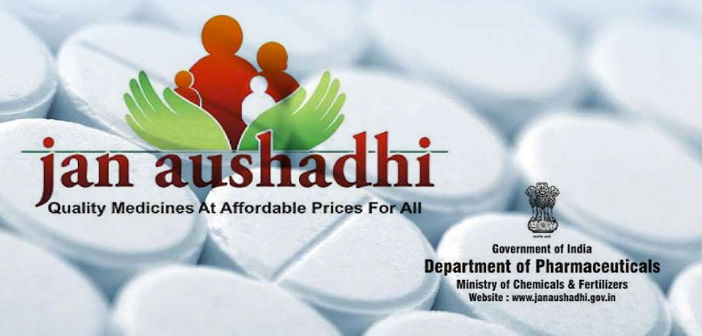Half of the Jan Aushadi Generic Drug Stores of the Government are not functioning

[orc]Generic Drugs are the lifeline to many poor patients who cannot afford the cost of the branded drugs. As a part of its mandate to promote Generic Drugs, the department of Pharmaceuticals of Government of India had launched the Jan Aushadi scheme and opened Jan Aushadhi Generic Drug Stores (JAGDS) across the country. But due to variety of reasons, more than 46% of these stores are now non-functional.
The Department of Pharmaceuticals in association with Central Pharma Public Sector Undertakings (Government of India), had launched the Jan Aushadhi scheme to provide quality medicines at affordable prices to the masses. Jan Aushadhi Generic Drug Stores (JAGDS) have been set up to provide generic drugs, which are available at lesser prices but are equivalent in quality and efficacy as expensive branded drugs.
What are Generic Drugs?
Generic drugs have the same efficacy and therapeutic value as that of branded medicines. But, the cost of generic medicines is much lesser than their branded equivalent. The quality, safety and efficacy of medicines are ensured by getting each batch of medicines procured from CPSUs as well as private suppliers tested from NABL approved laboratories and conforming to the required standards before the same are supplied to the JAGDS.
What are these stores & who operates them?
Two categories of JAGDS are allowed as per government policy
- To be opened in the premises of Hospitals by NGOs/Institutions/ Co-operative Societies as identified by State Governments.
- To be opened by other entities like, any reputed NGO/Charitable Society/Institution/Self help group/Individual entrepreneurs (Unemployed pharmacists/Doctors/Registered medical practitioners would be given preference for running the Stores).
In terms of financial assistance, a margin of 16% on the sale price is built in the MRP of each drug. In addition, the stores are eligible for one time financial assistance up to Rs. 2.00 lakh as establishment cost and up to Rs. 50,000/- as one time start up cost for purchase of computer hardware etc. There are also other incentives.
The stores sell generic drugs and the list of drugs available along with the price of each drug is updated on the Jan Aushadi website.
What is happening with these stores?
As on date, the government has opened 175 such JAGDS across 16 states/UTs. Out of these 175 stores, 81 are non-functional due to various reasons. In other words, more than 46% of these stores are non functional.
As far as individual states are concerned, highest number of stores were opened in Rajasthan (53) and all of them are non-functional now. 24 stores each were opened in Punjab & Jharkhand where 3 and 9 stores are non-functional respectively. All the stores opened by the government are functioning in states like Odisha, Himachal Pradesh, Jammu Kashmir & Madhya Pradesh. In Uttarakhand, Andhra Pradesh & West Bengal, all the stores that were opened are currently non functional.
These stores are closing down for a variety of reasons, most of which are to do with respective state government policies. The reasons include
- Health policy of the State Governments such as Haryana, Rajasthan and Tamil Nadu to provide free medicines from Govt. Hospitals.
- Non-prescriptions of generic medicines by Government Doctors
- Non-viability of Jan Aushadhi stores on account of non-availability of all the medicines and poor sale from the stores.
The Government has also conducted a review of performance of JAGDS through the Public Health Foundation of-India (PHFI). PHFI in their report observed that reasons responsible for the poor performance were, over dependence on support from State Government, Poor Supply Chain management, Non- prescription of Generic Medicines by the doctors, State Governments launching free supply of drugs and Lack of awareness.
What is the future plan?
The Government proposes to open more JAGDS all over the country. Originally, it was proposed to open at least one JAGDS in each district of the country. Under the New Business Plan, 3000 stores are proposed to be opened till the end of 12th Plan period (2012-2017).
The government has also launched a National Toll free helpline 1800-180-8080 for dissemination of information on generic versions with same drug compositions.
But unless there is active co-ordination and co-operation between the Central & State Governments, it is difficult to see the targets being achieved and these stores running successfully.